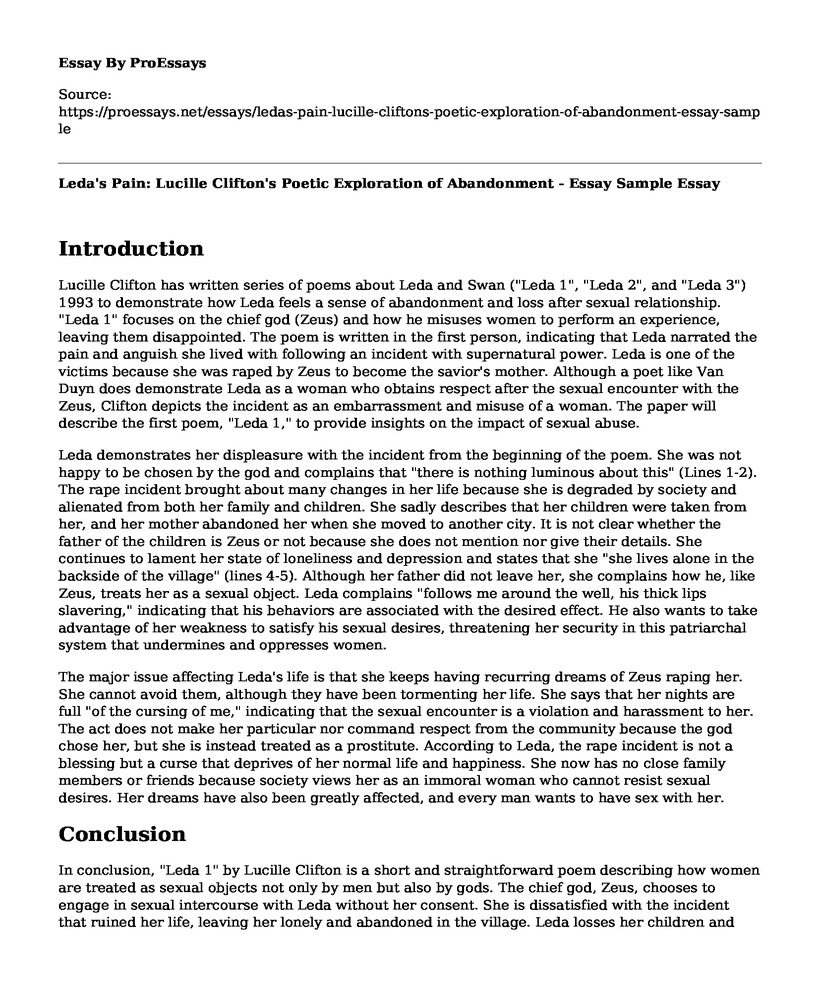Introduction
Lucille Clifton has written series of poems about Leda and Swan ("Leda 1", "Leda 2", and "Leda 3") 1993 to demonstrate how Leda feels a sense of abandonment and loss after sexual relationship. "Leda 1" focuses on the chief god (Zeus) and how he misuses women to perform an experience, leaving them disappointed. The poem is written in the first person, indicating that Leda narrated the pain and anguish she lived with following an incident with supernatural power. Leda is one of the victims because she was raped by Zeus to become the savior's mother. Although a poet like Van Duyn does demonstrate Leda as a woman who obtains respect after the sexual encounter with the Zeus, Clifton depicts the incident as an embarrassment and misuse of a woman. The paper will describe the first poem, "Leda 1," to provide insights on the impact of sexual abuse.
Leda demonstrates her displeasure with the incident from the beginning of the poem. She was not happy to be chosen by the god and complains that "there is nothing luminous about this" (Lines 1-2). The rape incident brought about many changes in her life because she is degraded by society and alienated from both her family and children. She sadly describes that her children were taken from her, and her mother abandoned her when she moved to another city. It is not clear whether the father of the children is Zeus or not because she does not mention nor give their details. She continues to lament her state of loneliness and depression and states that she "she lives alone in the backside of the village" (lines 4-5). Although her father did not leave her, she complains how he, like Zeus, treats her as a sexual object. Leda complains "follows me around the well, his thick lips slavering," indicating that his behaviors are associated with the desired effect. He also wants to take advantage of her weakness to satisfy his sexual desires, threatening her security in this patriarchal system that undermines and oppresses women.
The major issue affecting Leda's life is that she keeps having recurring dreams of Zeus raping her. She cannot avoid them, although they have been tormenting her life. She says that her nights are full "of the cursing of me," indicating that the sexual encounter is a violation and harassment to her. The act does not make her particular nor command respect from the community because the god chose her, but she is instead treated as a prostitute. According to Leda, the rape incident is not a blessing but a curse that deprives of her normal life and happiness. She now has no close family members or friends because society views her as an immoral woman who cannot resist sexual desires. Her dreams have also been greatly affected, and every man wants to have sex with her.
Conclusion
In conclusion, "Leda 1" by Lucille Clifton is a short and straightforward poem describing how women are treated as sexual objects not only by men but also by gods. The chief god, Zeus, chooses to engage in sexual intercourse with Leda without her consent. She is dissatisfied with the incident that ruined her life, leaving her lonely and abandoned in the village. Leda losses her children and her mother move to another town. Men in society view her as a sexual object to the extent that her father follows her around to satisfy his desires.
Cite this page
Leda's Pain: Lucille Clifton's Poetic Exploration of Abandonment - Essay Sample. (2023, Aug 28). Retrieved from https://proessays.net/essays/ledas-pain-lucille-cliftons-poetic-exploration-of-abandonment-essay-sample
If you are the original author of this essay and no longer wish to have it published on the ProEssays website, please click below to request its removal:
- Translation Analysis of "A Young Man Loves a Maiden" by Heinrich Heine
- Annotated Bibliography for Research on Summer Novel by Edith Wharton
- The Dangers of Being Judgmental - Literature Essay Example
- Analysis Essay on How Metaphor Is Used to Depict Power in Robert Browning's "My Last Duchess"
- Essay on Judy Blume: Champion of Modern Literature & Censorship Coalition
- Paper Example on Fantasy & Illusion: Tennessee Williams' 'The Streetcar Desire'
- Essay on Insights and Epiphanies: Understanding the Narrator's Transformation in 'Cathedral'







